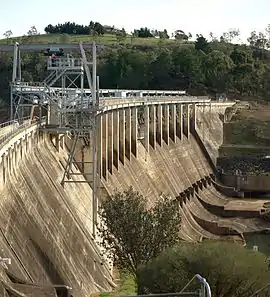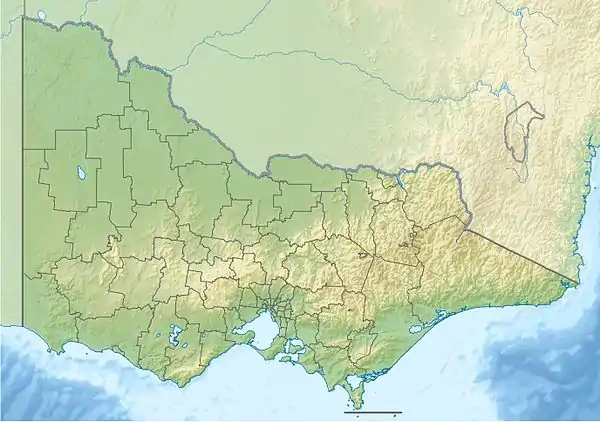Glenmaggie Dam
The Glenmaggie Dam is a concrete block-foundation gravity dam with 14 radial arm gates across the Macalister River, located near Maffra, Central Gippsland, in the Australian state of Victoria. The dam's purpose includes irrigation, the generation of hydro-electric power, water supply and conservation. The impounded reservoir is called Lake Glenmaggie.
| Glenmaggie Dam | |
|---|---|
 Downstream face | |
 Location of the Glenmaggie Dam in Victoria | |
| Country | Australia |
| Location | Sale, Central Gippsland, Victoria |
| Coordinates | 37°54′17″S 146°48′00″E |
| Purpose | Irrigation |
| Status | Operational |
| Construction began | 1919 |
| Opening date | 1927 |
| Owner(s) | Southern Rural Water |
| Dam and spillways | |
| Type of dam | Gravity dam |
| Impounds | Macalister River |
| Height | 37 m (121 ft) |
| Length | 295 m (968 ft) |
| Elevation at crest | 77 m (253 ft) AHD |
| Width (crest) | 99 m (325 ft) |
| Dam volume | 77,000 m3 (2.7 million cu ft) |
| Spillways | 2 |
| Spillway type | Uncontrolled |
| Spillway capacity | 3,400 m3/s (120,000 cu ft/s) |
| Reservoir | |
| Creates | Lake Glenmaggie |
| Total capacity | 190.410 million m3 (6.7243 billion cu ft) |
| Active capacity | 177.628 million m3 (6.2729 billion cu ft) |
| Inactive capacity | 4.86 million m3 (172 million cu ft) |
| Catchment area | 1,891 km2 (730 sq mi) |
| Surface area | 1,760 ha (4,300 acres) |
| Glenmaggie Power Station | |
| Commission date | 1994 |
| Turbines | 2 × Francis-type |
| Installed capacity | 4 MW (5,400 hp) |
| Annual generation | 9 GWh (32 TJ) |
| Website Glenmaggie Dam at Southern Rural Water | |
Location and features
Construction of the Glenmaggie Dam commenced in 1919, was completed in 1927 and constructed by the State Rivers and Water Supply Commission of Victoria. When full following its construction, the dam held 132,000 ML (4,700 million cu ft)[1] and provided irrigation to approximately 360 square kilometres (140 sq mi) of farming land in the Central Gippsland region; via a gravity irrigation systems to properties in the Macalister Irrigation District, near the towns of Maffra, Heyfield, Stratford and Sale. The Macalister Irrigation District covers about 53,000 ha (130,000 acres) around the Macalister and Thomson rivers, extending from Lake Glenmaggie to Sale. It comprises two areas: the Maffra-Sale Irrigation Area to the north of the Thomson River and the Central Gippsland Area (including the Nambrok-Denison Soldier Settlement district) to the south.[2]
The Glenmaggie Dam wall, which creates the Glenmaggie Lake, is a mass concrete overfall dam with irrigation outlets on both sides of the river serving irrigation channels. The central portion is an overfall spillway.[2] The dam wall was raised in 1958 by the addition of gates; stabilised using ground anchors in 1989;[3] and upgraded in 2003 to enable it to withstand overtopping.[2]
In 1994, a hydro-electric power station with two Francis turbine-generators was commissioned, with a capacity of 4 megawatts (5,400 hp) and generating 9 gigawatt-hours (32 TJ) per annum.[3][4]
Flooding
In June 2007, the Macalister catchment experienced record flooding. Inflows into Lake Glenmaggie peaked in excess of 250,000 ML (55 billion imp gal; 66 billion US gal) per day and releases peaked at 147,000 ML (32 billion imp gal; 39 billion US gal) per day. A second flood occurred in November 2007 with inflows into Lake Glenmaggie peaking at 70,000 ML (15 billion imp gal; 18 billion US gal) per day and releases peaking at 59,000 ML (13 billion imp gal; 16 billion US gal) per day. Repairs totaling around A$4 million were completed after the June and November 2007 floods.[1]
References
- "Lake Glenmaggie: History". Water resources: Water storages. Southern Rural Water. 2014. Archived from the original on 5 April 2015. Retrieved 4 March 2014.
- "Lake Glenmaggie". Water resources: Water storages. Southern Rural Water. 2014. Archived from the original on 15 April 2014. Retrieved 4 March 2014.
- "Register of Large Dams in Australia". Dams information. The Australian National Committee on Large Dams Incorporated. 2010. Archived from the original (Excel (requires download)) on 12 December 2013. Retrieved 4 March 2014.
- Dilawar, Singh (September 1999). "Renewable Energy Technologies in Australia and New Zealand" (PDF). United Nations Educational, Scientific and Cultural Organization. p. 24. Retrieved 5 March 2014.